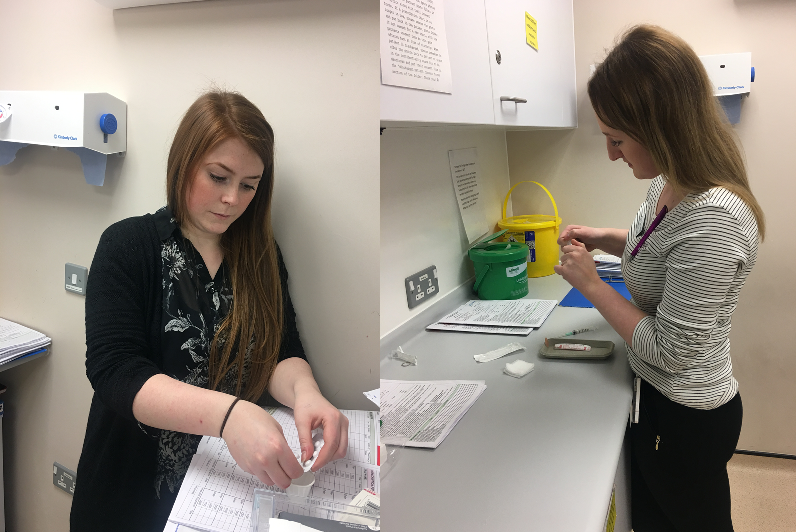Pictured: Lauren Bancroft (left) and Bronwyn Shaw (right)
Trainee nursing colleagues at a Plymouth health and social care organisation are using National Apprenticeship Week 2018 (NAW2018) to shout out about why they wouldn’t change their chosen path to a career full of opportunities.
The theme for this year’s celebration is Apprenticeships Work, and the apprentices at Livewell Southwest CIC illustrate that point perfectly.
Bronwyn Shaw says choosing an apprenticeship over going to university was the best thing she ever did.
She was set to start a health and social care degree after A levels, although she had no clear career plan. Then she spotted an advert for apprentices at Livewell Southwest.
“I didn’t know much about apprenticeships, but I knew it was more suited to more practical learning than academic,” she said.
Bronwyn applied and was offered a 12-month health and social care apprenticeship working at the Glenbourne Unit, Livewell’s acute mental health inpatient unit.
She said: “It was an amazing opportunity and I feel really lucky. I was studying one day a week and working the rest of the week on the wards, getting experience and learning in a supported environment with a mentor. All the team was involved – sharing their knowledge and expertise.”
Bronwyn secured a permanent job with Livewell once she completed her apprenticeship – and in September she applied successfully to join the two-year pilot trainee nursing associate programme at Livewell, training for a brand new role which bridges the gap between nursing assistants and registered nurses.
“I would never have been able to achieve all this without Livewell’s apprenticeship scheme. I will have a foundation degree, years of practical experience, and a job I love.”
Lauren Bancroft is a fellow trainee nursing associate who completed her health and social care apprenticeship. She was inspired to go into nursing by the care her grandad received during his final illness.
“I couldn’t have afforded to go to university to study for a nursing degree so getting an apprenticeship at Livewell to become a healthcare assistant was a really great opportunity to find a way into this career. I got a permanent job at Glenbourne when I qualified, and was then accepted onto the nursing associate pilot which I am absolutely loving. The support from colleagues is amazing and sometimes I can’t believe how far I have come and how much I am doing now.”
Livewell Southwest currently has 39 apprentices which include three trainee assistant practitioners, 12 business administration apprentices and trainee nursing associates.
Apprenticeships sit at the core of Livewell Southwest’s future workforce planning and fit with the commitment of the organisation – a social enterprise – to offer a range of routes into employment such as work experience and paid work placements, and to provide career progression pathways which enable the organisation to future-proof its workforce.
The organisation is shortlisted for the apprentice development category in this year’s Herald Business Awards – an award it won in 2016.
Dawn Slater, director of clinical practice and development, said: “We are committed to developing a well-skilled workforce to serve the changing care and support needs of our local population. That means investing in ongoing training and career development which is crucial to retaining colleagues.
“The apprenticeship programme is an essential element of that, and it’s good that the range of apprenticeships we offer continues to grow. We now offer Higher Level Apprenticeships and Foundation Degrees and employ trainee nursing associates as well as administration apprentices.
“We see it is a fantastic way to start an interesting and valued career, earn while you learn and achieve a nationally-recognised qualification. We hugely value the contribution apprentices make to our organisation, which is why we took the decision last year to pay £7.05 an hour from the outset, rather than making them wait until they are over 21 and have completed the first year, which is the Government recommendation.”


